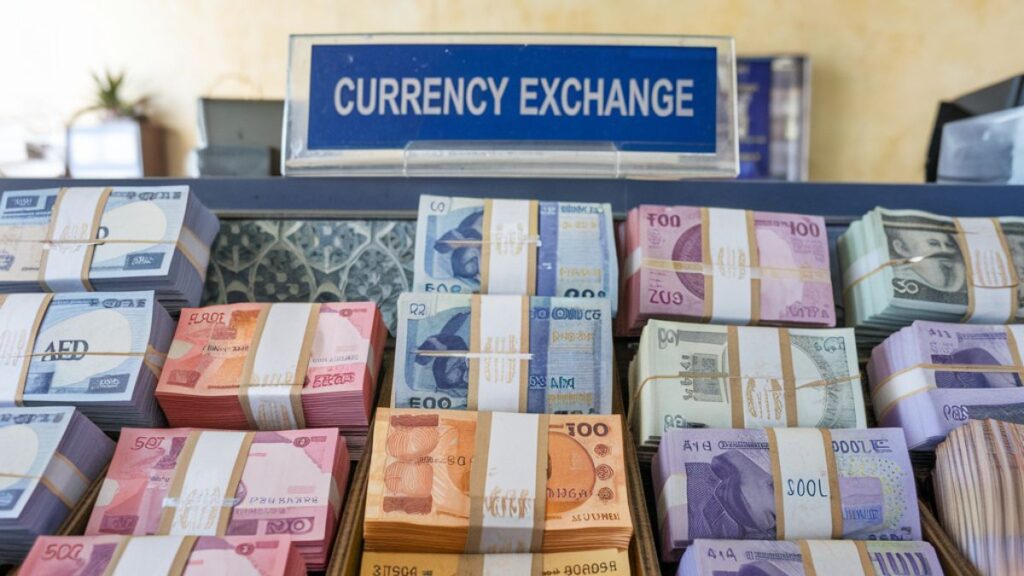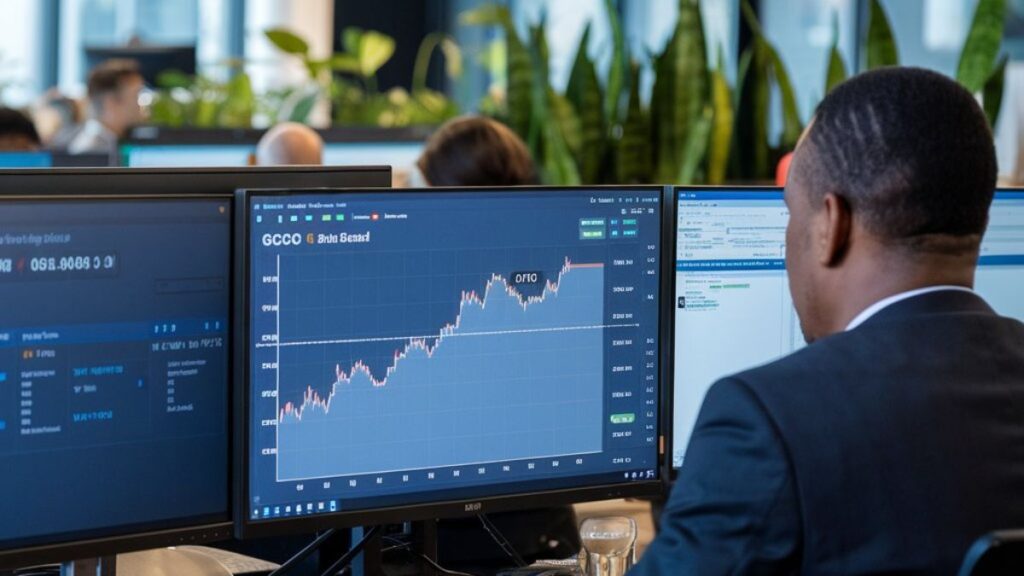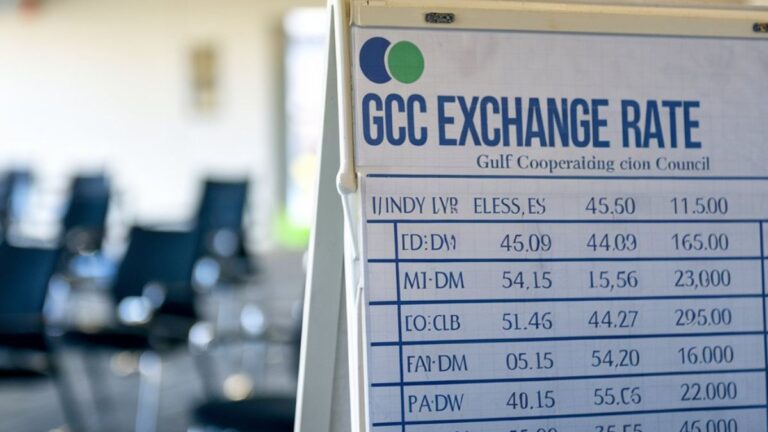The movement of (Gulf Cooperation Council) GCC Exchange Rate creates questions about their impact on financial operations. The exchange rate dynamics of both the UAE Dirham (AED) Saudi Riyal (SAR) Kuwaiti Dinar (KWD) and other Gulf currencies require understanding from all traders business owners and expatriates.
This article delves into:
- Exchanges rates in the GCC face influence from fundamental market components
- Comparisons of AED, SAR, KWD, and more
- The role of oil prices, economic policies, and global trade
- Future predictions and expert insights for 2024
Understanding GCC Exchange Rates
What Are GCC Exchange Rates?
Gulf region currencies define their exchange rates against prominent world currencies which include US Dollar (USD), Euro (EUR) and British Pound (GBP). Most Gulf Cooperation Council states tie their currencies to the US dollar and alternative countries operate floating exchange rate policies.
Fixed vs. Floating Exchange Rates in GCC
- Fixed Exchange Rates: All three currencies in the United Arab Emirates (AED), Saudi Arabia (SAR) and Qatar (QAR) maintain stable exchange rates with the US Dollar (USD) yet experience movement against other foreign currencies.
- Managed Floating Rates: The Kuwaiti Dinar function under managed floating rates by maintaining its value through linked currency baskets.
Key Factors Influencing GCC Exchange Rates
1. Oil Prices and GCC Currency Stability
The majority of the GCC nations seek financial stability through oil export revenue. The economies of the GCC become stronger when oil prices increase which in turn maintains their exchange rate stability. When oil prices decrease these economic regions experience financial strain that influences their exchange rate value.
2. US Dollar Strength and Its Impact
The exchange rates of GCC currencies strictly depend on their linkage to the USD since their currencies maintain a dollar-based peg system. A powerful USD creates financial stability within Gulf currencies even though it results in increased import prices.
3. Inflation and Interest Rates
- The exchange rate receives indirect impacts because rising inflation weakens purchasing power in GCC countries.
- GCC economies experience interest rate changes in the US since their central banks normally reevaluate their policies based on Federal Reserve actions.
4. Trade and Investment Trends
- The GCC promotes robust commercial activities with both China and India in addition to established ties with the EU. Changes in international connections have significant effects on currency exchange rate levels.
- Both foreign direct investment strategies and economic diversification initiatives represented by Saudi Vision 2030 significantly affect national goals.
Comparing GCC Currencies: AED, SAR, KWD & More

1. UAE Dirham (AED)
- Pegged to USD at 3.6725
- The currency shows high stability because it serves as a preferred choice for international financial operations.
- The stability of banking institutions throughout the country helps maintain exchange rate stability.
2. Saudi Riyal (SAR)
- Pegged to USD at 3.75
- The Saudi Arabian Vision 2030 enables economic diversification which guides upcoming rate patterns
- Heavily influenced by oil exports
3. Kuwaiti Dinar (KWD)
- The currency operates with an unspecified basket of currencies it does not link to USD
- Strongest currency globally (~3.30 USD per KWD)
- Dat mouth’s financial revenue from oil production along with its economic management determines currency market changes
4. Qatari Riyal (QAR)
- Pegged to USD at 3.64
- LNG export operations from Qatar act as an essential element for maintaining stability in the region
5. Omani Rial (OMR) and Bahraini Dinar (BHD)
- Both pegged to the USD
- Among the highest-valued currencies worldwide
- Economic reforms and oil dependency impact long-term stability
How GCC Exchange Rates Impact Businesses and Individuals

1. Import and Export Businesses
- A stable currency brings decreased risk levels for businesses involved in importing and exporting activities.
- The implementation of pegged exchange rates enables organizations to make better plans for international trading operations.
2. Expats and Remittances
- Foreign currency exchange rates influence how much value expatriates holding jobs in GCC nations receive from their sent remittances.
- Foreign workers who send money to nations with weaker currency systems experience advantages from a currency pegged to the United States dollar.
3. Investments and Real Estate
- Foreign investors choose to invest in Gulf real estate markets when the currency exchange rate shows stability.
- Currency policy modifications have the potential to affect how attractive property investments seem to potential buyers.
Predictions for GCC Exchange Rates in 2024
1. Will GCC Currencies Maintain Their Pegs?
Strong currency reserves together with economic policies will result in GCC currencies preserving their USD peg status. The process of economic diversification may push governments to make small changes in their policies.
2. Impact of Global Economic Shifts
- The increase of interest rates by the US Federal Reserve often leads GCC central banks to do the same which affects borrowing costs for business expansion.
- The stability level of Middle Eastern geopolitics strongly influences currency rate stability.
3. The Role of Digital and Cryptocurrencies
- Present-day Gulf countries are developing digital currency schemes that might affect their long-term conventional currency exchange systems.
- The future exchange rate strategies of the region face potential changes from central bank digital currencies (CBDCs).
Conclusion: Key Takeaways on GCC Exchange Rates
- Exchange rates in most GCC nations tie to the US dollar to maintain stability yet expose their currencies to US economic policies.
- The value of oil in the market creates stability for Gulf currencies because strong oil prices strengthen currency stability.
- Kuwaiti Dinar stands as the dominant currency throughout the region since the monetary authorities control its floating exchange rate mechanism.
- Exchange rate dynamics in the GCC nations for 2024 and after will be influenced by worldwide economic elements along with trading regulations and financial implementation strategies.
Knowledge about exchange rates combined with economic policies enables businesses and individuals to make better financial decisions in the Gulf Cooperation Council region.

